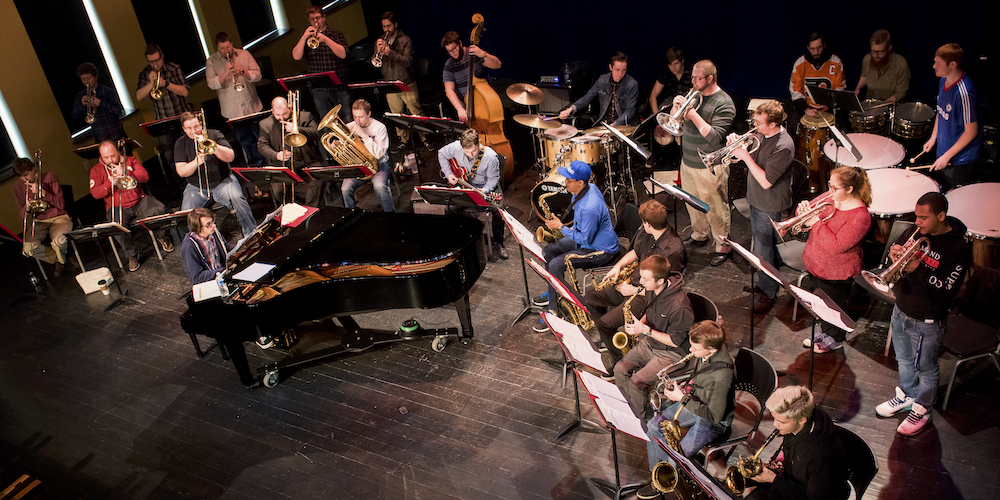
Chris Farr, Program Director
cfarr@uarts.edu
215.717.6337
C O N T E N T S
Description
The Jazz Studies instrumental curriculum provides a direct and pragmatic education for students interested in establishing a career in jazz and/or contemporary music. The goals of the program are to develop critical- thinking, problem-solving, literate, and highly skilled artists, entrepreneurs, and educators who will significantly affect their art form and society.
Students receive weekly, one-hour private lessons in their major area with renowned artist teachers. Performance opportunities are plentiful in the School’s award-winning jazz, ethnic, and popular music ensembles. The core of this curriculum is spread over four years and includes theory and musicianship (foundational, jazz, and advanced), piano, improvisation, technology, and music business. Additional study topics include recording, acoustics, orchestration, arranging, and an array of music history and literature courses.
Students can also select from courses in a wide variety of music, performing arts, visual arts, and business topics, and minors in music education, music business and technology, and other areas across the University.
Ensemble and performance opportunities play a critical part in the student’s education by sharpening technical and improvisation skills and increasing the student’s command of repertoire and styles. The School’s numerous performance ensembles represent a wide range of styles and categories of jazz, American, classical, contemporary, ethnic, and world music. Students are involved in a rigorous schedule of performances, with over 150 concerts and recitals presented each year.
Areas of Concentration: Clarinet, Saxophone, Woodwinds, Trumpet, Trombone, Tuba, Guitar, Electric and/or Upright Bass, Violin, Cello, Percussion, Drums, Hand Drums, Vibes, Piano, Flute
Woodwind majors may elect to enroll in a woodwind specialist program that includes the study of various woodwind instruments.
Program Objectives
Students graduating with a Bachelor of Music in Jazz Studies will:
- demonstrate outstanding aural musicianship;
- demonstrate outstanding cognitive musicianship and theoretical knowledge;
- understand music in its historical and sociological context;
- express understanding of music in verbal and written form;
- be musically literate and technically proficient performers and composers;
- possess knowledge and experience in a diversity of musical styles and cultures;
- acquire the skills to use and integrate current technology in support of their musicianship;
- use all of the above as the basis for creative output.
In addition, students graduating with a Bachelor of Music in Jazz Studies in Instrumental Performance will:
- demonstrate strong technique and artistry through the study of varied repertoire and technique exercises;
- demonstrate a knowledge and understanding of contemporary and traditional music theory;
- demonstrate knowledge of fundamental aural skills through singing, sight-reading, dictation and solo transcription;
- demonstrate an understanding of jazz forms, improvisational concepts, and how to apply them to a broad range of musical styles;
- demonstrate the ability to collaborate artistically with other performers, both vocal and instrumental, as a performer, arranger, creator and leader;
- demonstrate the ability to compose, orchestrate and create musical arrangements;
- demonstrate knowledge of current technological applications to assist in the creation of one’s art.
Program Requirements (120 credits)